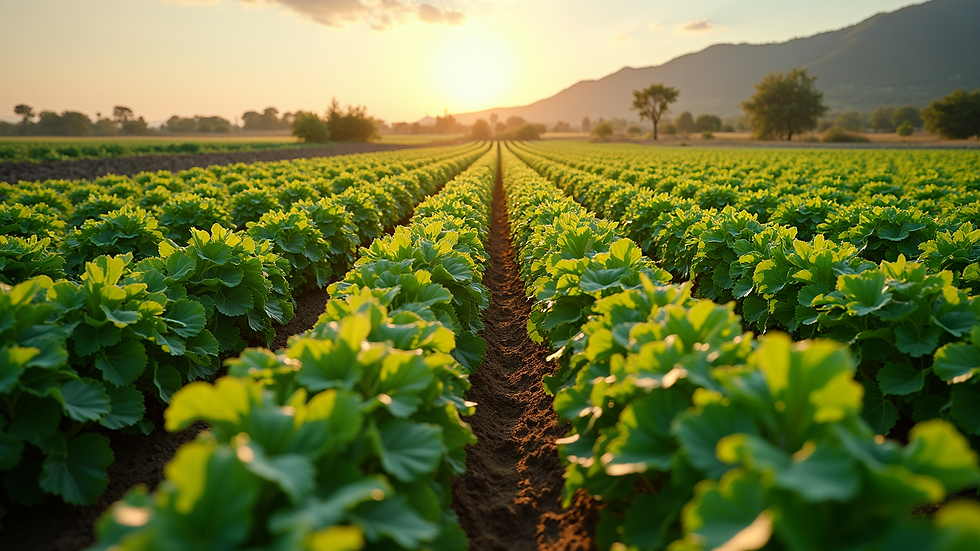The Future of Farming: Revolutionizing Agriculture with Sustainable Biotech Innovations
- edakeskintr
- Apr 16, 2025
- 4 min read
As the world’s population surges toward an estimated 9.7 billion by 2050, the urgency for sustainable agriculture is escalating. Innovations in biotechnology stand at the forefront of this transformation, promising to reshape farming in profound ways. By leveraging advanced biotech solutions, farmers can cultivate more resilient crops, increase yields, and minimize the environmental footprint of agriculture. This post reveals pivotal biotech innovations that are charting the course for a sustainable agricultural future.
The Role of Biotechnology in Agriculture
Biotechnology is essential for developing crops that can withstand changing environmental conditions. Techniques such as genetic modification and CRISPR gene editing empower scientists to enhance plants’ natural traits, creating crops that resist pests, diseases, and extreme weather events.
For example, a study showed that genetically modified drought-tolerant maize can yield up to 20% more under water-scarce conditions. Additionally, research indicates that these crops often require 30% less water compared to traditional varieties, representing significant resource conservation. This means farmers can grow healthier crops while using fewer inputs, ultimately leading to more sustainable practices.

Enhancing Nutritional Value
Exciting advancements in sustainable biotech include enhancing the nutritional profiles of staple crops. Biofortification aims to infuse essential vitamins and minerals like Vitamin A, iron, and zinc into crops such as rice, maize, and beans.
Take Golden Rice, which is genetically modified to produce higher levels of Vitamin A. This innovation addresses malnutrition, particularly in Asian countries where rice is a staple. Approximately 250 million children suffer from Vitamin A deficiency, leading to blindness and increased mortality rates. By introducing biofortified crops, we can enhance food security and improve health outcomes for vulnerable populations.
Pest and Disease Management
Conventional pest and disease control methods often rely on chemical pesticides and herbicides, which can harm the environment and human health. Sustainable biotech offers safer alternatives that reduce chemical usage significantly.
An example is Bt cotton, which is engineered to produce a natural insecticide that safeguards against cotton pests. Fields of Bt cotton have shown a substantial 60% reduction in the use of chemical pesticides compared to non-Bt counterparts. This not only helps protect ecosystems but also encourages biological diversity by allowing beneficial insects to thrive.

Water Efficiency and Conservation
Water scarcity poses a severe challenge for today’s agriculture. Sustainable biotech innovations address this issue directly by creating crops that need less water.
Researchers are developing plants with enhanced root systems that tap into moisture more efficiently. For instance, the development of salt-tolerant crops has opened up new agricultural possibilities in salty soils, which constitute over 20% of the earth's arable land. These advancements mean farmers can cultivate previously unusable land, boosting food production.
Reducing Carbon Footprint
Climate change is a pressing issue, with agriculture contributing a notable amount of greenhouse gas emissions. Sustainable biotech aims to lower this carbon footprint.
Biotech advancements can help create crops that store more carbon in their biomass. For example, certain genetically engineered plants can capture up to 40% more carbon dioxide compared to traditional varieties. Improved agricultural practices that enhance soil health and microbial activity also play a significant role in minimizing emissions.
Integrating Precision Agriculture
Precision agriculture, enhanced by biotechnology, enables farmers to monitor crop production with unparalleled accuracy. This approach utilizes data from sensors, drones, and satellite imagery alongside biotech improvements to evaluate crop health and soil conditions.
With this powerful combination, farmers can apply water, nutrients, and other resources more effectively. Case studies show that precision agriculture can reduce water usage by an average of 20%, leading to both cost savings and environmental benefits. These smarter practices foster sustainable farming and contribute to a resilient agricultural system.
Economic Benefits of Sustainable Biotech
Investing in sustainable biotech not only benefits the environment but also brings significant economic gains. For instance, farmers who adopt biotech practices can see up to a 30% increase in crop yields and a notable decrease in input costs, resulting in higher profitability.
Moreover, consumer demand for sustainably produced food is rising sharply. A survey found that 75% of consumers are willing to pay a premium for sustainably grown products. By embracing biotech innovations, farmers can access new markets that prioritize environmental responsibility, boosting their bottom line.
Challenges and Considerations
Despite the potential of sustainable biotech, challenges remain. Regulatory hurdles, public perception, and ethical concerns can hinder widespread adoption.
It is vital to maintain ongoing discussions among scientists, policymakers, and the public to communicate the benefits of these innovations clearly. Studies suggest that well-informed communities are more likely to accept biotech solutions, making education a critical component in overcoming resistance.
Paving the Path to a Sustainable Future
Sustainable biotech is reshaping agriculture by providing innovative solutions to meet the challenges of a growing population while safeguarding the planet. From enhancing nutritional value to improving pest management, water efficiency, and reducing greenhouse gas emissions, these innovations represent a comprehensive approach to sustainable farming.
As the agricultural community embraces biotechnology, it has the opportunity to create a more resilient, productive, and environmentally friendly food system for future generations. Investing in and supporting sustainable biotech practices is key to ensuring that farming protects both the earth and humanity for years to come.




It is possible that sustainable biotech innovations could transform agriculture by boosting yields, reduce chemical use, and help farmers adapt to climate challenges for a more resilient food system.